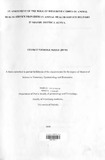An assessment of the role of different cadres of animal health service providers in animal health service delivery in Kiambu district, Kenya.
Abstract
This study was found necessary due to the changing nature of the veterinary services in
Kenya whereby, hitherto, the delivery of veterinary services had been solely dependent
on the government until some components were privatised. Privatisation was ad hoc as
there were no policies in place to ensure quality of the services provided. The overall
objective of the study was therefore to assess the role of private animal health service
providers in the provision of veterinary services in Kiambu District, Kenya. The specific
objectives were: 1) To identify and categorise the various ways farmers access veterinary
services in Kiambu District, Central Kenya; 2) To identify the problems experienced by
veterinary practitioners and farmers in the animal health service delivery in the district;
and 3) To identify the categories of veterinary service providers most frequently
consulted by farmers and the reasons behind it.
The study was conducted in Kiambu District, Kenya. The district is located in Central
Province. A total of 125 farmers and 21 animal health service providers were randomly
selected for the study. All data on household characteristics and animal health service
providers was obtained through questionnaires, which were administered via personal
interviews to the selected farmers and the animal health service providers.
The data was entered and managed in MS Excel. The data was then exported to SPSS
Statistical Software for statistical analysis on animal health service providers and
household characteristics.
A high percentage (86.4%) of Kiambu farmers consider livestock as their main source of
income, with 36% of farmers scoring it as the main source while 50.4% practised mixed
farming. About 66.4% of the farmers interviewed were in agreement that over half of
their household incomes were derived from livestock. All this demonstrates the
importance of livestock to the lives of the Kiambu people.
Kiambu farmers interviewed cited various constraints which they face in accessing of
veterinary services. Affordability topped the list with 48.8% (61/125) of the respondents
citing poverty as the greatest problem hindering their access to veterinary services. Other
reasons cited were infrastructure (28.8%; 36/125 of respondents), inadequate qualified
personnel (11.2%; 14/125) of the interviewed farmers indicated there was no constraints
at all. The animal health problems mostly encountered by the farmers in the district
included mastitis, tickbome diseases, reproductive diseases and helminthosis in that
order. About 52.8% (66/125) of the farmers interviewed singled out mastitis as the most
important disease in their animals, 24% (30/125) identified tickbome diseases, 14.4%
(18/125) reproductive diseases and 8.8% (11/125) talked of helminth os is.
Paraveterinarians, veterinarians, and the nearest agrovets attendants were identified as the
categories providing veterinary services in Kiambu District. The results show that
paraveterinarians serve the largest percentage of the farmers in Kiambu District (56.8%).
Among the reasons given for this were that they were readily available and charged less
compared to veterinarians. This can be attributed to the high number of animal health
assistants (AHTs) released each year into the market from Animal Health and Industry
Training Institutes (AHITIs).
Poverty among the farmers was identified by most animal health service providers
(38.1%; 8/21) as a major problem such that their clients could not afford their services.
This was closely followed by debts whereby 28.6% (6/21) of the animal heath service
providers talked of incurred debts after the service had been rendered. The two problems
above are closely intertwined. Other problems cited were unfair competition (19%; 4121
of the animal health service providers) and poor policies from the Government (14.3%;
3/21).
Citation
Masters of Science in Veterinary Epidemiology and Economics .Publisher
University of Nairobi Department of Public Health, Pharmacology and Toxicology, University of Nairobi, Kenya

